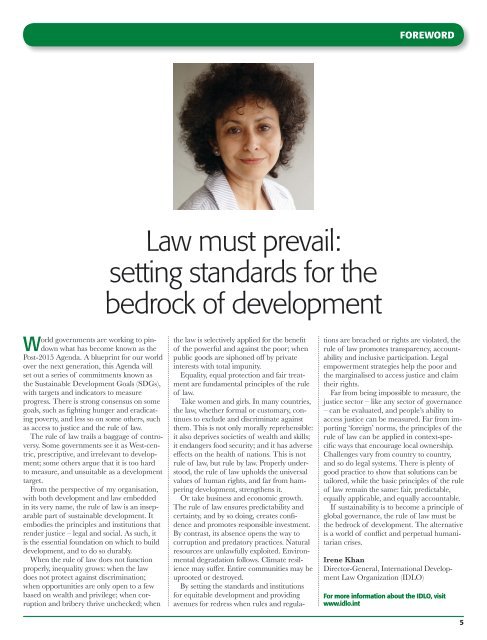SOURCE: Sustainable Development
SOURCE Sustainable Development magazine will be exploring the post 2015 international development landscape. It will engage the private sector to drive innovation and support the ever growing need to achieve the UN Sustainable Development goal’s
SOURCE Sustainable Development magazine
will be exploring the post 2015 international
development landscape.
It will engage the private sector to drive
innovation and support the ever growing
need to achieve the UN Sustainable
Development goal’s
Create successful ePaper yourself
Turn your PDF publications into a flip-book with our unique Google optimized e-Paper software.
FOREWORD<br />
Law must prevail:<br />
setting standards for the<br />
bedrock of development<br />
World governments are working to pindown<br />
what has become known as the<br />
Post-2015 Agenda. A blueprint for our world<br />
over the next generation, this Agenda will<br />
set out a series of commitments known as<br />
the <strong>Sustainable</strong> <strong>Development</strong> Goals (SDGs),<br />
with targets and indicators to measure<br />
progress. There is strong consensus on some<br />
goals, such as fighting hunger and eradicating<br />
poverty, and less so on some others, such<br />
as access to justice and the rule of law.<br />
The rule of law trails a baggage of controversy.<br />
Some governments see it as West-centric,<br />
prescriptive, and irrelevant to development;<br />
some others argue that it is too hard<br />
to measure, and unsuitable as a development<br />
target.<br />
From the perspective of my organisation,<br />
with both development and law embedded<br />
in its very name, the rule of law is an inseparable<br />
part of sustainable development. It<br />
embodies the principles and institutions that<br />
render justice – legal and social. As such, it<br />
is the essential foundation on which to build<br />
development, and to do so durably.<br />
When the rule of law does not function<br />
properly, inequality grows: when the law<br />
does not protect against discrimination;<br />
when opportunities are only open to a few<br />
based on wealth and privilege; when corruption<br />
and bribery thrive unchecked; when<br />
the law is selectively applied for the benefit<br />
of the powerful and against the poor; when<br />
public goods are siphoned off by private<br />
interests with total impunity.<br />
Equality, equal protection and fair treatment<br />
are fundamental principles of the rule<br />
of law.<br />
Take women and girls. In many countries,<br />
the law, whether formal or customary, continues<br />
to exclude and discriminate against<br />
them. This is not only morally reprehensible:<br />
it also deprives societies of wealth and skills;<br />
it endangers food security; and it has adverse<br />
effects on the health of nations. This is not<br />
rule of law, but rule by law. Properly understood,<br />
the rule of law upholds the universal<br />
values of human rights, and far from hampering<br />
development, strengthens it.<br />
Or take business and economic growth.<br />
The rule of law ensures predictability and<br />
certainty, and by so doing, creates confidence<br />
and promotes responsible investment.<br />
By contrast, its absence opens the way to<br />
corruption and predatory practices. Natural<br />
resources are unlawfully exploited. Environmental<br />
degradation follows. Climate resilience<br />
may suffer. Entire communities may be<br />
uprooted or destroyed.<br />
By setting the standards and institutions<br />
for equitable development and providing<br />
avenues for redress when rules and regulations<br />
are breached or rights are violated, the<br />
rule of law promotes transparency, accountability<br />
and inclusive participation. Legal<br />
empowerment strategies help the poor and<br />
the marginalised to access justice and claim<br />
their rights.<br />
Far from being impossible to measure, the<br />
justice sector – like any sector of governance<br />
– can be evaluated, and people’s ability to<br />
access justice can be measured. Far from importing<br />
‘foreign’ norms, the principles of the<br />
rule of law can be applied in context-specific<br />
ways that encourage local ownership.<br />
Challenges vary from country to country,<br />
and so do legal systems. There is plenty of<br />
good practice to show that solutions can be<br />
tailored, while the basic principles of the rule<br />
of law remain the same: fair, predictable,<br />
equally applicable, and equally accountable.<br />
If sustainability is to become a principle of<br />
global governance, the rule of law must be<br />
the bedrock of development. The alternative<br />
is a world of conflict and perpetual humanitarian<br />
crises.<br />
Irene Khan<br />
Director-General, International <strong>Development</strong><br />
Law Organization (IDLO)<br />
For more information about the IDLO, visit<br />
www.idlo.int<br />
5<br />
SSD_Khan_Foreword.indd 5 04/03/2015 19:34
















